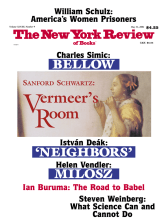To the Editors:
In his “Wagner & Politics” [NYR, November 2, 2000], Bernard Williams disagrees with various arguments in my Richard Wagner: The Man, His Mind, and His Music. He sees “evasion” in my contention that in Wagner’s dramas (the Ring and Parsifal, in particular) the magnificent music alone has lasting value and keeps the works before the public, the words and actions often having the hostile purpose of reflecting his racial theorizing. Williams’s declaration that “one cannot adequately explain the power of Wagner by simply appealing to the music” cannot be gainsaid; but value and power are very different things, the latter perhaps the most damaging element in the Wagnerian experience. My separation of score and text represent not evasion but resolve.
Citing my observation that “Parsifal’s sudden insight in the magic garden was the realization that by yielding to Kundry he would dilute his purebred strain,” Williams looks upon this perception as without support in the libretto and no more than the view of “someone who thought about little but Wagner’s racist writings.” (In fact, I do find much to ponder in Wagner’s indelible musical monuments.) However, my Richard Wagner opens to plain sight inescapable parallels between the libretto of Parsifal and the composer’s contemporary racist essays, those vicious, vitriolic tracts Williams dismisses simply as “crazy” and with limited relevance to the operas.
Can so light a complexion be put on the matter? Such craziness, indeed, the very diction of these pamphlets found intimidating authority in the writings and harangues of Houston Stewart Chamberlain, Adolf Hitler, and Alfred Rosenberg and ultimate, terrifying actuality in the Nuremberg race laws, decrees invested with the spirit of both Parsifal’s Grail temple and magic garden.
Parisfal makes his way to the garden straight from the temple. He has just heard the humiliated King Amfortas lament the catastrophe afflicting the Grail brotherhood: he, its ruler, has infected himself by a sexual adventure with a debased inferior; his blood, sullied and in revolt, surges and rages in confusion. Here are sum and substance of Wagner’s essay “Heldentum und Christentum“: it warns of the danger such commixture poses to Germanic racial purity. That Amfortas communicates the disgrace of racial calamity in music of compelling beauty should not close the mind to his aria’s and the essay’s source in the same polluted well, not a minor business, in my opinion. Yet Williams maintains that Wagner’s racial theories “do not structure the work [Parsifal], or surface in it, or demand our attention in experiencing it.”
The nationalistic/racial explosions erupting throughout Lohengrin and Meistersinger have another dimension and arose from Wagner’s obsessive interest in the Holy Roman Empire. He harbored deep romantic nostalgia for this ancient political structure the Habsburgs had dissolved little more than seven years before his birth. Surveying with a cursory Wagnerian glance (in “Die Wibelungen,” written close upon the completion of Lohengrin) the Empire’s eighteen centuries, Wagner identified the point in its history when German racial purity had first suffered compromise: the fall of the Hohenstaufen dynasty at the hands of a Frenchman—Charles of Anjou. But Wagner recognized a marvelous counterbalance long in preparation: Siegfried had been reborn in the person of Emperor Frederick Barbarossa even as the Nibelungen hoard mysteriously ascended, a marvel, Wagner declared, accomplished in the German consciousness. Having soared aloft, the hoard became transmuted into the Holy Grail; for Wagner, hoard and cup had coalesced: the process begun in the depths of the Rhine was to find resolution in the Grail temple, and Parsifal would preside over the cleansing of the stolen gold, now transformed into the stolen spear. Heightened by marvelous music, these symbols of a new German past made up of myth, magic, and erotic fantasy induced that atmosphere of holy mystery Hitler breathed in with awe. Wagner’s crazy ideas did have consequences.
As he wandered through these strange corridors, Wagner never let go his very practical links to contemporary German politics: he shifted from one alliance to another in attempts to align himself with the winning side in the final struggle between Vienna and Berlin for primacy in German affairs.
Praise is due Bernard Williams’s perceptive comments upon the paradox inher-ent in the scene depicting Siegfried’s funeral cortège (Götterdämmerung): an overwhelming instrumental eulogy celebrating the career of a hero at most a cipher; the corpse of a nullity, who showed more than a touch of an idiot, passes in procession as Wagner’s orchestra pours forth its most noble sounds—a Sonderweg, indeed!
For a moment, Williams slides under his lens Thomas Mann’s Betrachtungen eines Unpolitischen. To this glance I would add a brief look at Mann’s early story “The Blood of the Walsungs,” in particular the burlesque of the Jewish Aarenhold twins making love after a performance of Walküre.
Robert W. Gutman
New York City
Bernard Williams replies:
Professor Gutman reminds us of the subsequent political history of ideas associated with Bayreuth, and of Wagner’s later racist writings. I did not deny either of these things, and I emphasized the first. The question is, how far any given work must be interpreted in these terms if we are to make honest sense of it now, and in the case of Parsifal, he still does not persuade me that it must. The associations he mentions may well have existed in Wagner’s mind, but that does not make them necessary to interpreting the work.
This Issue
May 31, 2001



